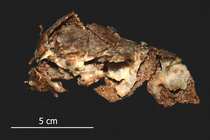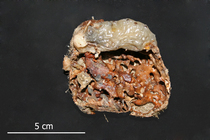
| About | | Search taxa | | Taxon tree | | Search literature | | Checklist | | Stats | | Log in |
Traits taxon detailsAlectona millari Carter, 1879
134115 (urn:lsid:marinespecies.org:taxname:134115)
accepted
Species
marine,
Carter, H.J. (1879). On a New Species of Excavating Sponge (<i>Alectona millari</i>); and on a New Species of <i>Rhaphidotheca</i> (<i>R. affinis</i>). <em>Journal of the Royal Microscopical Society.</em> 2: 493-499, plsXVII-XVIIa.
page(s): 494-496 [details]
de Voogd, N.J.; Alvarez, B.; Boury-Esnault, N.; Cárdenas, P.; Díaz, M.-C.; Dohrmann, M.; Downey, R.; Goodwin, C.; Hajdu, E.; Hooper, J.N.A.; Kelly, M.; Klautau, M.; Lim, S.C.; Manconi, R.; Morrow, C.; Pinheiro, U.; Pisera, A.B.; Ríos, P.; Rützler, K.; Schönberg, C.; Turner, T.; Vacelet, J.; van Soest, R.W.M.; Xavier, J. (2025). World Porifera Database. Alectona millari Carter, 1879. Accessed through: Marine Species Traits editorial board (2025) Marine Species Traits at: https://www.marinespecies.org/traits/aphia.php?p=taxdetails&id=134115 on 2025-04-26
Marine Species Traits editorial board (2025). Marine Species Traits. Alectona millari Carter, 1879. Accessed at: https://www.marinespecies.org/traits/aphia.php?p=taxdetails&id=134115 on 2025-04-26
Date action by
original description
Carter, H.J. (1879). On a New Species of Excavating Sponge (<i>Alectona millari</i>); and on a New Species of <i>Rhaphidotheca</i> (<i>R. affinis</i>). <em>Journal of the Royal Microscopical Society.</em> 2: 493-499, plsXVII-XVIIa.
page(s): 494-496 [details] context source (Deepsea) Census of Marine Life (2012). SYNDEEP: Towards a first global synthesis of biodiversity, biogeography and ecosystem function in the deep sea. Unpublished data (datasetID: 53), available online at http://www.comlsecretariat.org/wp-content/uploads/2010/06/SYNDEEP-Towards-a-first-global-synthesis-of-biodiversity-biogeography-and-ecosystem-function-in-the-deep-sea-Eva-Ramirez-Llodra-et-al..pdf [details] basis of record Rützler, K. (2002 [2004]). Family Alectonidae Rosell, 1996. Pp. 281-290. <em>In: Hooper, J.N.A.; Van Soest, R.W.M. (eds) Systema Porifera. A guide to the classification of sponges.</em> Kluwer Academic/ Plenum Publishers, New York, 1708 + xvliii. ISBN 978-1-4615-0747-5 (eBook electronic version). [details] Available for editors basis of record Rützler, K. (2002). Family Alectonidae Rosell, 1996. Pp. 281-290. <em>In: Hooper, J.N.A.; Van Soest, R.W.M. (eds) Systema Porifera. A guide to the classification of sponges. 2 volumes.</em> Kluwer Academic/ Plenum Publishers, New York, 1708 + xvliii. ISBN 0-306-47260-0 (printed version). [details] Available for editors additional source Alander, H. (1935). Additions to the Swedish sponge fauna. <i>Arkiv för Zoologi 28B(5)</i>: 1-6 (look up in IMIS) page(s): 3 [details] additional source Stephens, J. (1917). Report on the sponges collected off the coasts of Ireland by the dredging expeditions of the Royal Irish Academy and the Royal Dublin Society. <em>Proceedings of the Royal Irish Academy.</em> 34 (B): 1-16. page(s): 4 [details] additional source Carballo, J.L.; Garcia-Gómez, J.C. (1994). Esponjas del Estrecho de Gibraltar y áreas próximas, con nuevas aportaciones para la fauna Iberica [Porifera from the Straits of Gibraltar and nearby areas, new species of the Iberian fauna]. <em>Cahiers de Biologie Marine.</em> 35(2): 193-211. (look up in IMIS) page(s): 195 [details] additional source Balduzzi, A.; Bianchi, C.N.; Boero, F.; Cattaneo-Vietti, R.; Pansini, M.; Sarà, M. (1989). The suspension-feeder community of a Mediterranean sea cave. <i>In</i>: J.D. Ros (Ed.). Topics in Marine Biology. <em>Scientia Marina.</em> 53 (2): 387-395. page(s): 390 [details] additional source Rützler, K. (1966). Die Poriferen einer sorrentiner Höhle. Ergebnisse der Österreichischen Tyrrhenia-Expedition 1952. Teil. XVIII. <em>Zoologischer Anzeiger.</em> 176 (5), 303-319. page(s): 313 [details] Available for editors additional source Hooper, J.N.A. (2005). Porifera (sponges). pp 174-177, 478-479. <i>In</i>: Rohde, K. (ed.) ‘Marine Parasitology.' (CSIRO Publishing: Melbourne). page(s): 175 [details] Available for editors additional source Voultsiadou, E. (2005). Sponge diversity in the Aegean Sea: Check list and new information. <em>Italian Zoology.</em> 72 (1): 53-64. page(s): 55 [details] Available for editors additional source Saritas, M.Ü. (1972). A preliminary study on the silicious Sponge (Porifera) Fauna of Engeceli Limani in the Gulf of Izmir (Aegean Sea). <em>Scientific reports of the Faculty of Science, Ege University.</em> 143, 1-25 (in Turkish). page(s): 13; pl II fig 6, fig 7 [details] additional source Evcen, A.; Çinar, M.E. (2012). Sponge (Porifera) species from the Mediterranean coast of Turkey (Levantine Sea, eastern Mediterranean), with a checklist of sponges from the coasts of Turkey. <em>Turkish Journal of Zoology,.</em> 36, 460-464. page(s): 463 [details] Available for editors additional source Corriero, G.; Scalera-Liaci, L.; Ruggiero, D.; Pansini, M. (2000). The sponge community of a semi-submerged Mediterranean cave. <em>Marine Ecology.</em> 21 (1), 85-96. page(s): 89 [details] Available for editors additional source Corriero, G.; Abbiati, M.; Santangelo, G. (1997). Sponges inhabiting a Mediteranean red coral population. <em>Marine Ecology.</em> 18 (2), 147-155. page(s): 149 [details] Available for editors additional source Corriero, G.; Scalera-Liaci, L.; Gristina, M.; Riggio, S.; Mercurio, M. (1997). Composizione tassonomica e distribuzione della fauna e Poriferi e Briozoi in una grotta semisommersa della riserva naturale marina "Isola di Ustica". <em>Biologia Marina Mediterranea.</em> 4 (1), 34-43. page(s): 37 [details] additional source Carteron, S. (2002). Etude taxonomique des Spongiaires du Liban. <em>Rapport de Maitrise, Centre d'Océanologie de Marseille.</em> 1-26. page(s): 11 [details] Available for editors additional source Evcen, A.; Cinar, M.E. (2015). Bioeroding sponge species (Porifera) in the Aegean Sea (Eastern Mediterranean). <em>J. Black Sea/Mediterranean Environment.</em> 21 (3): 285-306. page(s): 292 [details] Available for editors additional source Solórzano, M.R. (1990). Poríferos del litoral gallego: estudio faunístico, distribución e inventario. <em>Phd Thesis Unversidad de Santiago de Compostela.</em> 1036 pp. page(s): 407-409; Lám. 34 [details] Available for editors additional source Jennings, A.V. (1891). On a variety of <i>Alectona Millari</i> (Carter). <em>Zoological Journal of the Linnean Society.</em> 23: 531-539. [details] additional source Longo, C.; Cardone, F.; Pierri, C.; Mercurio, M.; Mucciolo, S.; Marzano, C.N.; Corriero, G. (2018). Sponges associated with coralligenous formations along the Apulian coasts. <em>Marine Biodiversity.</em> 48(4): 2151-2163., available online at https://doi.org/10.1007/s12526-017-0744-x page(s): 2156 [details] Available for editors additional source Pulido Mantas, T.; Bavestrello, G.; Bertolino, M.; Cerrano, C.; Pica, D.; Roveta, C.; Calcinai, B. (2025 ["2022"]). A 3D Innovative Approach Supporting the Description of Boring Sponges of the Precious Red Coral <i>Corallium rubrum</i>. <em>Journal of Marine Science and Engineering.</em> 10(7): 868 (1-18)., available online at https://www.mdpi.com/2077-1312/10/7/868 page(s): 3-6 [details] additional source Van Soest, R.W.M. (2001). Porifera, <b><i>in</i></b>: Costello, M.J. <i>et al.</i> (Ed.) (2001). <i>European register of marine species: a check-list of the marine species in Europe and a bibliography of guides to their identification</i>. <em>Collection Patrimoines Naturels.</em> 50: 85-103. (look up in IMIS) [details] additional source Alander, H. (1942). Sponges from the Swedish west-coast and adjacent waters. <em>Ph.D. Thesis. (University of Lund, H. Struves: Gøteborg).</em> Pp. 1-95, 15 pls. page(s): 74 [details] Available for editors additional source Pouliquen, L. (1972). Les spongiaires des grottes sous-marines de la région de Marseille: Ecologie et systématique. <em>Téthys.</em> 3(4): 717-758. page(s): 127 [details] additional source Pulitzer-Finali, G. (1983). A collection of Mediterranean Demospongiae (Porifera) with, in appendix, a list of the Demospongiae hitherto recorded from the Mediterranean Sea. <em>Annali del Museo civico di storia naturale Giacomo Doria.</em> 84: 445-621. page(s): 500-502; fig 29 [details] Available for editors additional source Rützler, K. (1965). Systematik und Ökologie der Poriferen aus Litoral-Schattengebieten der Nordadria. <em>Zeitschrift für Morphologie und Ökologie der Tiere.</em> 55(1): 1-82. page(s): 25 [details] Available for editors additional source Sarà, M. (1961). La fauna di Poriferi delle grotte delle isole Tremiti. Studio ecologico e sistematico. <em>Archivio zoologico italiano.</em> 46: 1-59,pls I-II. page(s): 38 [details] Available for editors additional source Stephens, J. (1915). Sponges of the Coasts of Ireland. I.- The Triaxonia and part of the Tetraxonida. <em>Fisheries, Ireland Scientific Investigations.</em> 1914(4): 1-43, pls I-V. page(s): 27-28 [details] additional source Topsent, E. (1904). Spongiaires des Açores. <em>Résultats des campagnes scientifiques accomplies par le Prince Albert I. Monaco.</em> 25: 1-280, pls 1-18., available online at https://biodiversitylibrary.org/page/40603003 page(s): 111-112 [details] additional source Vacelet, J. (1969). Eponges de la Roche du Large et de l'étage bathyal de Méditerranée (Récoltes de la soucoupe plongeante Cousteau et dragages). Mémoires du Muséum national d'Histoire naturelle. <em>Mémoires du Muséum national d'Histoire naturelle (A, Zoologie).</em> 59(2): 145-219, pls I-IV. page(s): 171 [details] Available for editors additional source Wesche, S.J.; Adlard, R.D.; Hooper, J.N.A. (1997). The first incidence of clionid sponges (Porifera) from the Sydney rock oyster <i>Saccostrea commercialis</i> (Iredale and Roughley, 1933). <i>Aquaculture 157(1-2)</i>: 171-178 (look up in IMIS) page(s): 173 [details] additional source Maldonado, M. (1992). Demosponges of the red coral bottoms from the Alboran Sea. <em>Journal of Natural History.</em> 26: 1131-1161. (look up in IMIS) page(s): 1134 [details] Available for editors  Present Present  Inaccurate Inaccurate  Introduced: alien Introduced: alien  Containing type locality Containing type locality
|


